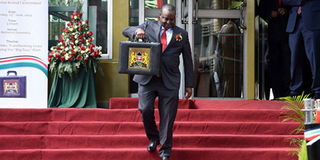Overtaxing betting firms hurts economy

Treasury Cabinet Secretary Henry Rotich with the Budget briefcase at the National Treasury on his way to Parliament to present the 2019/2020 Budget on June 13, 2019. PHOTO | EVANS HABIL | NATION MEDIA GROUP
What you need to know:
- Betting companies have come out to state their disappointment in the government’s proposal to impose an excise tax on gamers’ stakes.
- The proposal to tax stakes is not viable in any given economy and will, definitely, result in a boom in underground illegal business.
- Despite the numerous taxes, the law still requires betting firms to pay a further 30 per cent corporation tax on their profits.
Filling the country’s gaping budget hole is certainly going to hurt. So here is a question for the National Treasury: What would hurt more, introducing punitive taxes on industries that are seen to be booming, such as betting, or reducing government spending on non-priority projects?
Economics tells us that targeted, punitive tax increases like the ones aimed at the betting industry hurt the economy immediately by reducing demand. In other words, increase taxes and Kenyans would have less money to spend.
TAXATION
In most cases, consensus has been reached and an amicable middle ground arrived at after an honest debate on the pros and cons of a taxation regime that is being put forward.
Nowhere has such high-handedness been more pronounced than in anything or any service labelled ‘sin tax’ by governments of the day.
In Kenya, the latest entrants into the ‘sin tax’ bracket are the betting firms, who often are doing clean business and following all the rules of the land set out to them by the very government but who are often hounded for what appears to be none other than the pursuit of additional tax revenue.
Betting companies have come out to state their disappointment in the government’s proposal to impose an excise tax on gamers’ stakes. A stake is the amount of money risked on the results of a game.
BOOM
In fairer tax jurisdictions, stakes are never taxed. The proposal to tax stakes is not viable in any given economy and will, definitely, result in a boom in underground illegal business.
This decision does not follow any best practice and the tax, which is the first of its kind, will be detrimental to the socioeconomic growth of the country. Constant tax increases are not an optimal and sustainable strategy for building a favourable business environment.
Therefore, stakeholders in the industry must join hands and urge the government to adopt an inclusive approach, reconsider the offensive tax and collectively craft a direction which will benefit both the government and businesses in Kenya.
A few years ago, when the Treasury proposed a 35 per cent tax on betting firms, they demonstrated how such measures would drive them out of business and the government eventually listened.
If that law had passed, betting firms in Kenya would have been required to pay 35 per cent of their gross revenue to the Kenya Revenue Authority (KRA).
CORPORATION TAX
Despite the numerous taxes, the law still requires betting firms to pay a further 30 per cent corporation tax on their profits.
Quick mathematics shared with the relevant arms of government indicated that, if such a punitive taxation measure was to be applied to the top-five highest tax-paying firms in Kenya, they would all sink into the loss-making territory.
In its place, the Treasury and the gaming firms agreed on a compromise of 15 per cent tax on revenue as proposed thereafter in the Betting, Lotteries and Gaming (Amendment) Act. In addition, the Treasury proposed that 20 per cent of all winnings be remitted to the taxman.
Save for the need for a clarification in a case where, say, one wins a car, this was a compromise deal for the betting companies and the Treasury. The 30 per cent corporation tax was also applied.
Before the amendments, all lotteries were taxed at five per cent of their sales, betting firms at 7.5 per cent, casino gambling 12 per cent and competitions such as raffles 15 per cent — besides other taxes and levies.
SH600 MILLION
While the taxation had a few ramifications, like SportPesa being unable to continue a Sh600 million annual sports sponsorship and a number of betting firms closing shop or moving their operations online, the taxation levels was agreed upon and players complied.
The government has stated its intention to control betting practices due to the side-effects of irresponsible betting, gambling and gaming on the general population. However, it must not lose sight of the critical tax revenue agenda, which will definitely get lost if betting firms close shop.
For the betting firms, the main issue on the table is remaining profitable without breaking any law and regulation. In the same breath, the laws and regulations should not be punitive and high-handed and reached without consultations.
Individuals have invested resources to have the betting companies up and running. It is only fair to both the government and the betting firms that they consult and agree on a middle ground.
Ms Wangare is an entrepreneur. [email protected]



